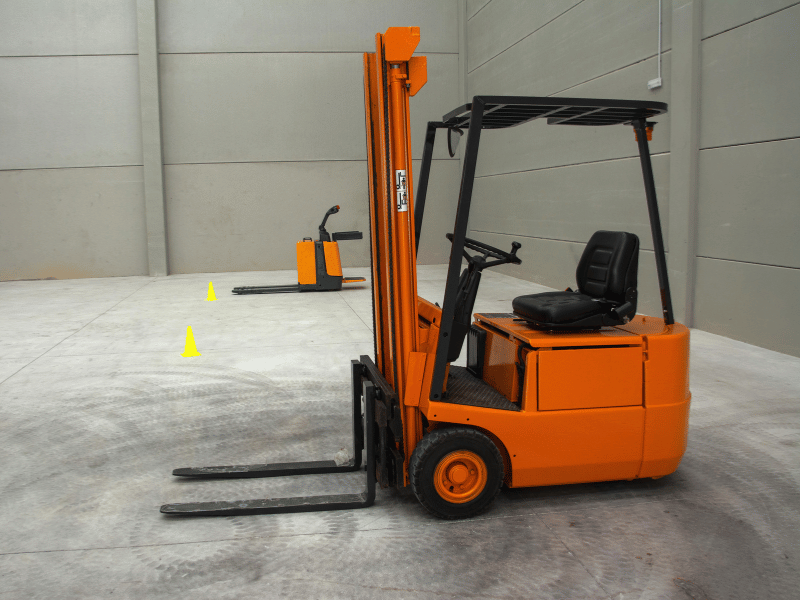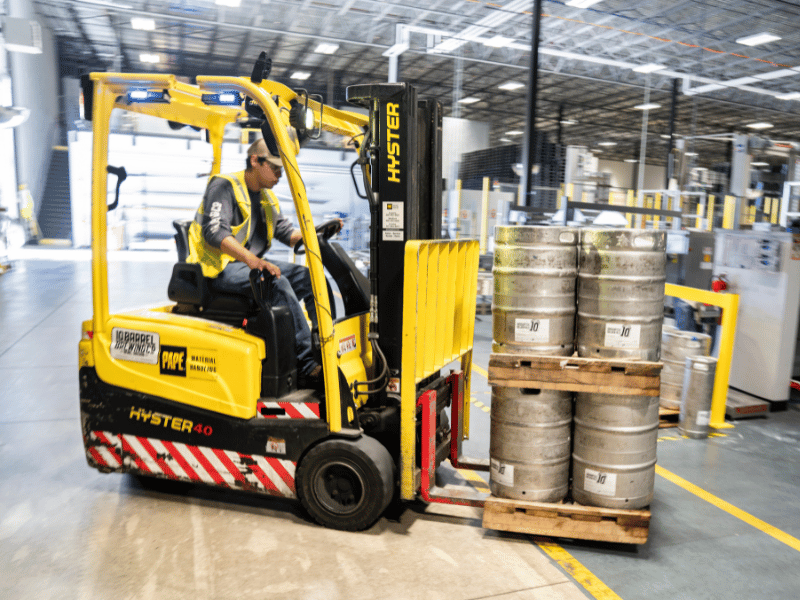Forklift training is vital in complying with OSHA Occupational Safety and Health Standards. These industrial machines pose significant safety risks if not operated responsibly.
This handy guide discusses the critical requirements for undergoing OSHA forklift training.
Table of Contents

What Is a Forklift Injury or Fatality?
Forklifts, also called powered industrial trucks or lift trucks, are machines used to move heavy loads in non-roadway areas like warehouses. They include order pickers and powered platform trucks. When categorizing forklift incidents, the type of forklift or the source of the incident isn’t the primary consideration. Instead, the National Safety Council (NSC) says the forklift incident is categorized by event type.
Most forklift injuries fall within these two event types:
- Transportation incident
- Contact with object or equipment incident
Importance of OSHA Forklift Safety Training
Forklift incidents may result in legal violations, injuries, and even death. NSC shares that in 2022, forklifts were involved in accidents that led to 73 work-related deaths. Additionally, there were 24,960 Days Away, Restricted, or Transferred (DART) cases involving forklifts, most of which were in Service Providing Industries. 15,480 DART cases involved Days Away from Work (DAFW) cases in 2021-2022.
OSHA (Occupational Safety and Health Administration) says each powered industrial truck type can lead to different hazards. Workplace conditions and types may also lead to more forklift incidents.
Forklift injuries may happen when:
- Forklifts accidentally drive off loading docks
- Forklifts fall between docks, and unsecured trailers
- Forklifts strike workers
- Workers fall from elevated pallets and tines

OSHA Forklift Training Requirements
OSHA forklift training is designed to equip operators with the skills to operate forklifts safely and minimize the risks of accidents, injuries, and fatalities in the workplace. OSHA standard on Powered Industrial Trucks 29 CFR 1910.178(l)(2)(ii) requires the following:
Employers must create a training program for safe truck operation covering the following topics:
- General principles of safe truck operation
- Types of vehicles used in the workplace
- Hazards created by vehicle use in the workplace
- General safety requirements of OSHA standard
Trained operators must demonstrate proper and safe job performance through workplace evaluation.
- Training should include both formal (lecture, video, etc.) and practical (demonstration, exercises) components.
- Employers must certify each operator’s training and evaluate them at least once every three years.
- Employers should assess the operator’s performance and competence in safe truck operation before they are allowed to operate a forklift.
- Refresher training is required if the operator shows inadequacy in safe truck operation.
- Refresher training should include formal instruction, either by lecture and discussion, interactive computer training, practical exercises and demonstrations, and workplace evaluation of the operator’s performance.
See also: OSHA Training Quick Guide
OSHA Forklift Training Topics
29 CFR 1910.178(l)(3) says that forklift operators need training in the following topics unless the employer shows the topic isn’t necessary for safe truck operation in their workplace:
- Operating instructions, warnings, and precautions for the truck types the operator will be authorized to operate
- Differences between a truck and an automobile
- Truck controls and instrumentation, their location, purpose, and how they work
- Engine or motor operation
- Steering and maneuvering
- Visibility including restrictions due to loading
- Fork and attachment adaptation, operation, and use limitations
- Vehicle capacity and stability
- Any vehicle inspection and maintenance that the operator will be required to perform
- Refueling and/or charging and recharging of batteries
- Operating limitations
- Any other operating instructions, warnings, or precautions listed in the operator’s manual for the vehicle types that the employee is being trained to operate
- Surface conditions where the vehicle will be operated
- Composition of loads to be carried and load stability
- Load manipulation, stacking, and unstacking
- Pedestrian traffic in areas where the vehicle will be operated
- Narrow aisles and other restricted places where the vehicle will be operated
- Hazardous (classified) locations where the vehicle will be operated
- Ramps and other sloped surfaces that could affect the vehicle’s stability
- Closed environments and other areas where insufficient ventilation or poor vehicle maintenance could cause a buildup of carbon monoxide or diesel exhaust
- Other unique or potentially hazardous workplace environmental conditions that could affect safe operation

OSHA Forklift Refresher Training Requirements
29 CFR 1910.178(l)(4) requires operators displaying a deficiency in safely operating their forklift to undergo a refresher training and evaluation.
Refresher training must provided when:
- The operator is observed operating the vehicle unsafely.
- The operator is involved in an accident or near-miss incident.
- An evaluation determines unsafe operator behavior.
- Assigning an operator to a different type of truck.
- Workplace conditions change in a way that affects safe operation.
Employers should evaluate each operator’s performance at least once every three years. If an operator has already received training on a specific forklift training topic and has been found competent, they don’t need more training on that topic. However, if the type of truck they’re using and the workplace conditions have changed, they should undergo training again.
OSHA Forklift Certification Requirements
Does OSHA require forklift certification? Yes, forklift certification is required for operators before they can use a forklift in the workplace. Employers certify forklift operators according to OSHA standard 29 CFR 1910.178(l)(6). If employees were hired before December 1, 1999, they should have been certified by the same exact date. If hired after December 1, 1999, they should complete training and evaluation before they can operate a forklift.
The forklift OSHA certification should include the following information:
- Operator name
- Training date
- Evaluation date
- Name of trainer/s or evaluator/s
Benefits of Proper Forklift Training
Following OSHA forklift training requirements offers several benefits. First, it helps employers comply with OSHA standards and avoid fines and legal penalties. Secondly, it teaches operators to identify and reduce potential workplace hazards. Perhaps most importantly, forklift training helps keep workers feel safe so they can perform work efficiently with peace of mind and confidence.







